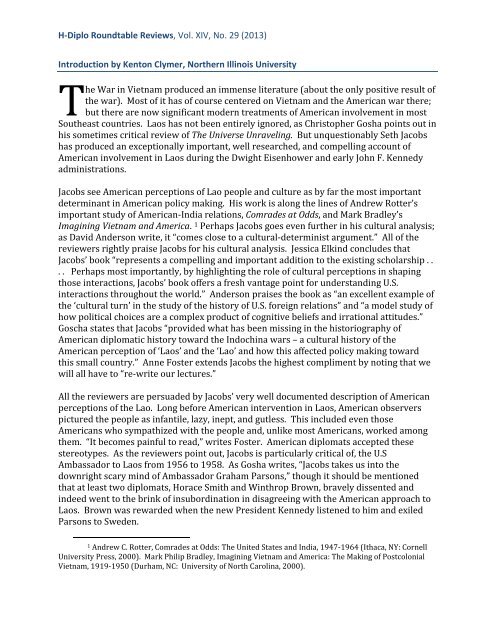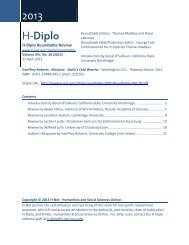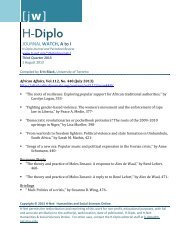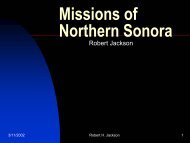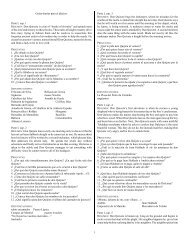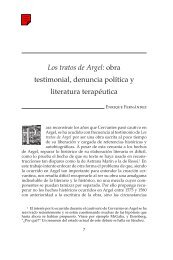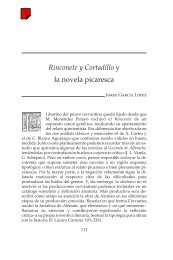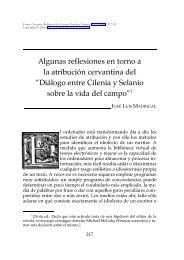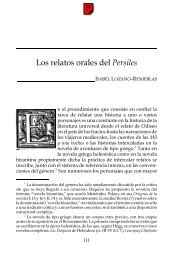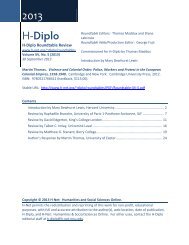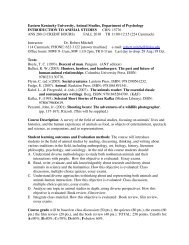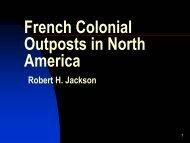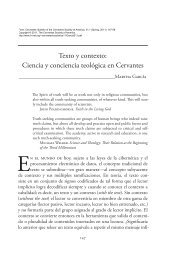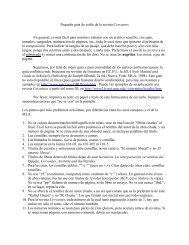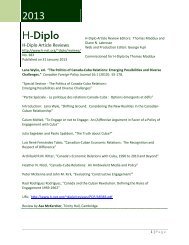H-Diplo Roundtables, Vol. XIV, No. 29 (2013) - H-Net
H-Diplo Roundtables, Vol. XIV, No. 29 (2013) - H-Net
H-Diplo Roundtables, Vol. XIV, No. 29 (2013) - H-Net
You also want an ePaper? Increase the reach of your titles
YUMPU automatically turns print PDFs into web optimized ePapers that Google loves.
H-<strong>Diplo</strong> Roundtable Reviews, <strong>Vol</strong>. <strong>XIV</strong>, <strong>No</strong>. <strong>29</strong> (<strong>2013</strong>)<br />
Introduction by Kenton Clymer, <strong>No</strong>rthern Illinois University<br />
T<br />
he War in Vietnam produced an immense literature (about the only positive result of<br />
the war). Most of it has of course centered on Vietnam and the American war there;<br />
but there are now significant modern treatments of American involvement in most<br />
Southeast countries. Laos has not been entirely ignored, as Christopher Gosha points out in<br />
his sometimes critical review of The Universe Unraveling. But unquestionably Seth Jacobs<br />
has produced an exceptionally important, well researched, and compelling account of<br />
American involvement in Laos during the Dwight Eisenhower and early John F. Kennedy<br />
administrations.<br />
Jacobs see American perceptions of Lao people and culture as by far the most important<br />
determinant in American policy making. His work is along the lines of Andrew Rotter’s<br />
important study of American-India relations, Comrades at Odds, and Mark Bradley’s<br />
Imagining Vietnam and America. 1 Perhaps Jacobs goes even further in his cultural analysis;<br />
as David Anderson write, it “comes close to a cultural-determinist argument.” All of the<br />
reviewers rightly praise Jacobs for his cultural analysis. Jessica Elkind concludes that<br />
Jacobs’ book “represents a compelling and important addition to the existing scholarship . .<br />
. . Perhaps most importantly, by highlighting the role of cultural perceptions in shaping<br />
those interactions, Jacobs’ book offers a fresh vantage point for understanding U.S.<br />
interactions throughout the world.” Anderson praises the book as “an excellent example of<br />
the ‘cultural turn’ in the study of the history of U.S. foreign relations” and “a model study of<br />
how political choices are a complex product of cognitive beliefs and irrational attitudes.”<br />
Goscha states that Jacobs “provided what has been missing in the historiography of<br />
American diplomatic history toward the Indochina wars – a cultural history of the<br />
American perception of ‘Laos’ and the ‘Lao’ and how this affected policy making toward<br />
this small country.” Anne Foster extends Jacobs the highest compliment by noting that we<br />
will all have to “re-write our lectures.”<br />
All the reviewers are persuaded by Jacobs’ very well documented description of American<br />
perceptions of the Lao. Long before American intervention in Laos, American observers<br />
pictured the people as infantile, lazy, inept, and gutless. This included even those<br />
Americans who sympathized with the people and, unlike most Americans, worked among<br />
them. “It becomes painful to read,” writes Foster. American diplomats accepted these<br />
stereotypes. As the reviewers point out, Jacobs is particularly critical of, the U.S<br />
Ambassador to Laos from 1956 to 1958. As Gosha writes, “Jacobs takes us into the<br />
downright scary mind of Ambassador Graham Parsons,” though it should be mentioned<br />
that at least two diplomats, Horace Smith and Winthrop Brown, bravely dissented and<br />
indeed went to the brink of insubordination in disagreeing with the American approach to<br />
Laos. Brown was rewarded when the new President Kennedy listened to him and exiled<br />
Parsons to Sweden.<br />
1 Andrew C. Rotter, Comrades at Odds: The United States and India, 1947-1964 (Ithaca, NY: Cornell<br />
University Press, 2000). Mark Philip Bradley, Imagining Vietnam and America: The Making of Postcolonial<br />
Vietnam, 1919-1950 (Durham, NC: University of <strong>No</strong>rth Carolina, 2000).


